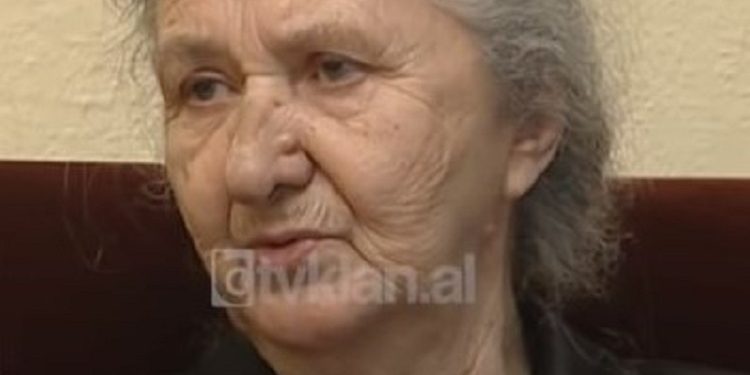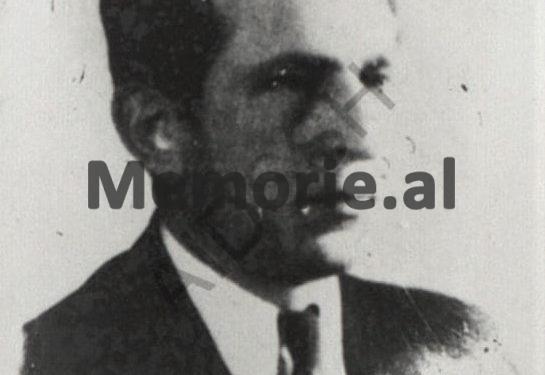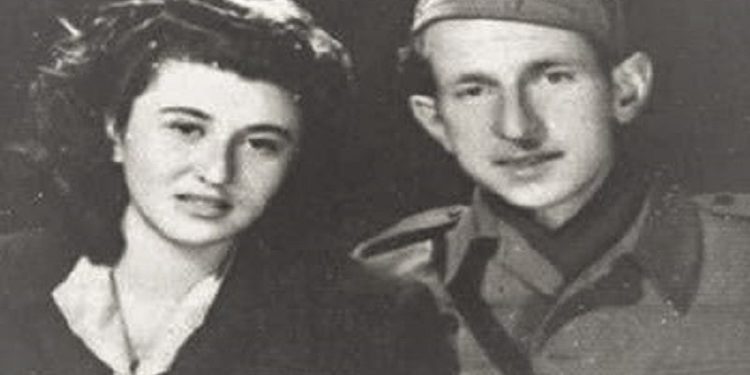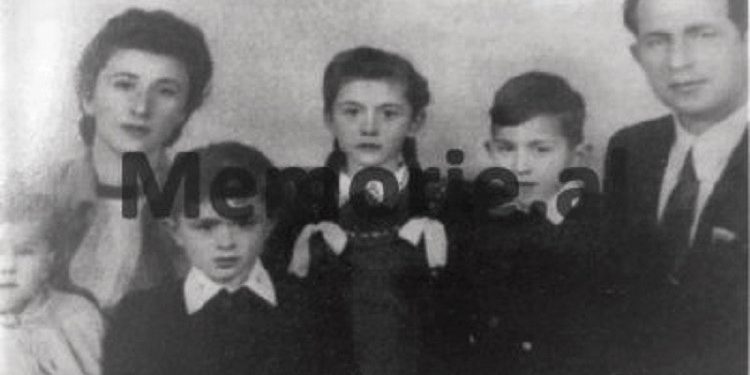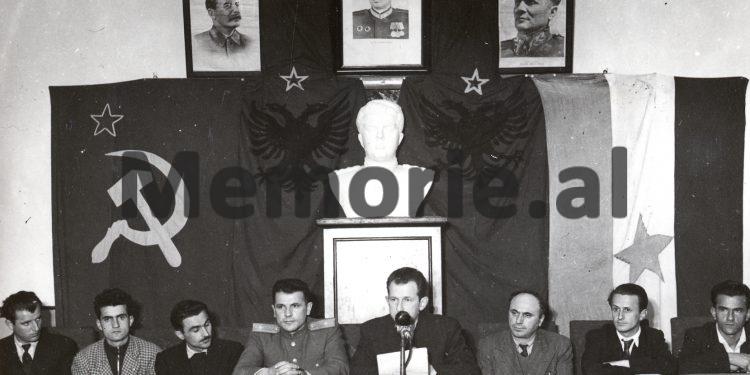Second part
Memorie.al / He dared to tell the truth and was barbarically crucified. He openly stated that Enver Hoxha was not elected Chairman of the NPSH at the founding meeting and ended up in the hell of the communist prisons. What happened to Tuk Jakova, one of the main protagonists of the beginning of the communist movement in Albania, is as painful as it is cruel. Mita Jakova and his friend, years ago, in a confession for the show “Histori me zhurmues”, of the well-known journalist and moderator, Pandi Laço, on “Klan” TV, reveal for the first time a complete retrospective of the tragedy, experienced by the former commissar of Mehmet Shehu’s First Assault Brigade.
With an admirable memory of age and the ordeal of suffering, Tuk Jakov’s wife talks about the circumstances in which she connected her life with him, who entrusted her with the task of the head of the first partisan unit, what were his relations with Mehmet Shehu, when they shared the responsibilities of the commander and the commissar of the First Assault Brigade, how the first conflicts with Enver arose and who initiated the sectarian attitude of the communist leaders towards him, to mitigate the class war and compromising relations with the Catholic Clergy, etc.
The suffering and drama after her husband’s conviction for “high treason against the motherland” occupies a special place in the story of Mita Jakova, who had to survive with her four children, with many hardships and extraordinary sacrifices.
However, from all the experiences of that terrible ordeal, this noble woman is hostage to the conditions in which one of the daughters died and the still unsolved mystery of how her husband died in the prison hospital, in the late evening of the 26 August 1959…!
Continues from the previous issue
Miss Mita! It is said that Tuku made one of the first clashes regarding the way the National Liberation War Museum was organized?
One night before that, we were talking with Tuku at home. We were more than husband and wife. We were comrades in arms, we were comrades, friends. And we talked like that. He told me that the next day, the plenum would be held, which would discuss the history of the party. “What about you,” I said, “will you argue that I haven’t seen you prepare?” He told me that he would talk about the distortions that had been made to the truths related to the creation of the party.
“I am part of those events and I don’t need to prepare,” he explained. “These are delicate issues, I told him, and care must be taken”! “The truth is the truth and there is no need to hesitate to prove it as such”, answered Tuku with unquestionable conviction.
Tuku was a courageous man and he spoke openly, regardless of the effects his words could have on others. Formalism, servility and demagoguery, were the vices that he hated with his soul…!
It is known that the first blow to Tuk Jakov was given in the 1955 plenum. Who targeted him and what were the real motives of this clash?
It became the infamous plenum. In the beginning, the report was read by Enveri and as usual, discussions were expected. Surprisingly, no one stood up. And who could be led to discuss what the most powerful man of the time said.
The shadow of the first tempted them and made them gather in themselves. Tuku stood up first. Enver, who knew his conviction, coughed as if to give the signal to the others. When Tuku finished, there was a break. After the break, Nexhmije Hoxha stood up and openly opposed the problems raised by Tuku.
Her analysis called Tuku’s attitudes “principled deviations”. Exactly, the problems that Nexhmija raised, later became part of the resolution of the plenum. From April 1955, that is, after this plenum, until June when the decision was made, Tuku was placed in an isolated circle and was constantly monitored. He came to work, with door guards.
He was not allowed to leave Tirana without receiving official permission. All his friends left. No one met him. They asked him to self-criticize and affirm that; where he was inspired by anti-party attitudes. They began to point out the deviations, from the Communist Group of Shkodra, the connections with the Catholic Clergy, the softening of the class war, etc.
Tuku, idealist as he was, tried to do self-criticism, but it did not work and he was expelled from the Central Committee. Immediately after that, we were sent to Berat with our families. Tuku was taken there to work in a carpentry shop, in an old workshop.
Then that period of persecution began. An inhumane persecution, I would say. There was nothing more terrible than the situation that was imposed on us. People looked at us with surprise and hatred and immediately left us when we confronted them. They ran away, as if to escape from a bad disease.
So you moved from a house in “Blok” to a poor shelter on the outskirts of Berat?
They took us to Berat, to a shack built in the middle of a swamp, full of frogs and snakes. The humidity was very high. All four children experienced serious health consequences from living there. We spent almost 15 years there. Completely isolated. This killed Tuku spiritually. I remember his shock when they took his pistol away.
When he handed it over, according to the order, he told the policemen to record the number, in the hope that one day things would be clarified and he would be able to get it back. He remembered it from the illegal days of the war. They took away the ranks. They took away the title “Hero of the People”.
At that time we only had each other. We only relied on each other. Tuku, honest as he was, with that spiritual purity that characterized him, sat down one day and wrote a letter to the Central Committee of the Communist Party of the Soviet Union.
I took that letter to the Soviet embassy in Tirana. I looked for the ambassador and got his secretary. I gave it to him and turned, hoping for a possible reflection, on the attitude towards us. After two months, where we were, the letter was returned to us, without any answer. They brought them to our apartment, just as it was.
Let’s come to another event. After being expelled from the party in 1957, Tuku was isolated in the Kanina fortress…?!
Before we come to this moment, I wanted to explain the circumstances before the isolation in Kanina Castle. In November of 1956, when Dali Ndreu and Liri Gega were shot, we were brought the decision of exile, which meant that we would live in those conditions, but now, with a big difference.
Every day we had to report to the Internal Affairs Branch. We continued in this state until May 24, 1957. On this very day, which coincided with the 13th anniversary of the engagement, Tuku was isolated in the fortress of Kanina, and later on the island of Zvërnec. On January 4, 1958, he was arrested…!
Do you remember why they accused him?
A bunch of stale accusations and no concrete facts. They told him about “high treason” and put him in a cell. I often went to see him. Meetings with him were very expensive. I remember the first meeting, when I went with the four children, whom until then, I had not told that he was in prison, but with service. They took us out of a small room behind the prison, always between bars and policemen.
The children had just finished school and had taken their receipts with them to show Tuku. All had excellent grades. The way the reception was booked was terrible. We were not allowed, no physical contact. I was told earlier that, if I shook his hand, they would interrupt the meeting. As Tuku approached, he extended his hand longingly. I didn’t know what to do. I raised my arms and crossed them over the children’s shoulders.
I did it to let Tuku understand that if we can’t meet together, I’m hugging the children for you too. This was the first meeting. Even more creepy, was the last one. It was June 22, 1959. I went, as usual, to the meeting with the children. He missed her a lot. This time, the little girl went to tell her father that she had learned to write. We met him between two pairs of bars.
Watch over there, watch over here! He asked to hug the children. They did not allow it in any way. “At least the little one,” he pleaded with the police. “Not even that”! They reacted harshly. Meanwhile, Tuku, tearful and revolted, turned to the officer of the Ministry of Interior, who was accompanying us. “What is happening here is not possible even in the prisons of fascism.” In an instant, the children gave way to crying.
A very difficult situation arose and I did not know what to do. The commanding and brutal voices of the police put an end to the meeting. This was the last one. Only a little later, in August 1959, from the prison, he was taken to the hospital, where he died under mysterious circumstances…!
How were they informed about his death?
On August 19, 1959, I went to see him in prison. But when I showed up there, they told me that he was hospitalized. When I asked about what, they reassured me, explaining that; it was something unimportant. “A light appendix”, they explained to me. “He went to be operated on and after a week, he will be back.” On August 26, 1959, I was informed that Tuku is very ill. They even informed me that they would take me by car, so I had to take the children with me.
So we did. We got into the car and set off with hope, to find him with our breath. First we went to the ministry, as was the rule. There we were met by Filat Muçua, who, without making a sound, told me to follow him from behind, into the deep offices of the first floor of the ministry. I entered there in a big room. My legs couldn’t support me and I found a table to lean on. I couldn’t stand it and asked him: “What do you want to tell me? What happened to Tuku”? “Tuku died last night,” he said, “at 12:00.”
“We did everything,” he continued, “but that’s all he wrote, as the people say.” Informed me about a “privilege” that had been reserved for me on this occasion. “As a rule, explained Muçoja, family members are not allowed to see those who die in prison. But Tuku’s case is special and we will let you see it”. After a few moments, I got out and took the road to the morgue. When I arrived there, I saw from the opposite door, Tuku’s mother was entering, together with his brother, Kol Jakova.
We crossed the gate and found ourselves inside. When we looked at you. The sight was shocking. Immediately I gathered myself and began to communicate with him. “Dear Tuk, – I told him, – sleep peacefully, because I will become strong, as you wanted. Don’t worry about the children. I will bring them to life and educate them, as if I had you in my arms”. At the end, when I was going to say goodbye, I greeted him as we used to greet the partisans who were killed at the front. I raised my fist and uttered the magic formula: Death to fascism, my soul!
And I ran away, not knowing where to go. Tuku’s mother put her arm around me and we went out together into the yard. There she didn’t hold back and began with a song: “I’m sorry, son, that I wasn’t by your side.” Only a few moments passed and the police warned us to leave. Meanwhile, the car that would take us to Berat had also arrived. The mother-in-law begged the officer accompanying us to let us go to her house that night in Tirana. “No”, he told her emphatically. I left and went to meet the children.
They were waiting for me, what news would I bring them about Tuku, and they immediately asked me: “How is dad?” “Now you don’t have a father anymore,” I told them, “but let’s go home.” The evening took us to the poplars of Durrës. It was a wedding day and an orchestra could be heard nearby, accompanying the rhythms of the wedding song. “Eh, – I said to myself, – how did I shoot like this in life. Someone cries and chokes with sadness, others sing and explode with joy…”!
What do you know about the circumstances in which Tuku died in the prison hospital?
The official authorities were satisfied with those few explanations. And where else can you ask. However, after the 1990s, the first options came for the mysterious death of Tuku. The first to clarify the circumstances of that fateful night was a resident from Velipoja, who was his roommate in the hospital.
This is how he told us: “They brought him to our room, without explaining who he was. From the moment they brought him in, they added guards. After two or three days he got better and started to communicate. We found out that the surgeon Aleko Bozgo had operated on him.
On the fourth day, his health deteriorated. He had a very high temperature and was shivering. On the last night, another doctor came to visit him. When we asked him about his condition, he did not speak to us at all. A few moments later, doctor Ylvi Vehbiu came.
Apparently they had called him for Tuku. When he left the visit, I asked him what was wrong. “There is no way out,” he answered and explained that on the card, it was written that his gall bladder had ruptured, but it is not true, it has not ruptured.
We later spoke with doctor Ylviu himself. That night they had called to visit him, a few hours before he passed away. This is how doctor Ylviu told us: “When I went, Tuku was in the bracket. Very high temperature. It was in complete agony. I had nothing to do, except to ease his agony.
I remember that at one point he sobered up and said ‘They are wrong to act like this and go contrary to world developments…’! More or less even to this day, the circumstances in which Tuku passed away are still unclear. More than one death, it looks like a murder, in the prison hospital.
Question: Meanwhile, you had another misfortune in your life…?!
Yes, a disaster with one of the children, which is even more serious. To tell the truth, I had very good children. Their progress in school and exemplary behavior gave me the satisfaction that my efforts with them were not in vain. Vjosa was an excellent student. He finished high school with very good results. He had to apply for high school. But who would dare to take the daughter of the enemy of the people, Tuk Jakova, to university.
It was in this situation that she wrote a letter to Mehmet Shehu. She bore his wartime nickname for her name. Surprisingly and when we did not expect it, the answer came that the right to study Chemistry-Biology had been approved. He started high school with great joy. In the third year, he suffered a very big shock. It all came from the abandonment by the boy who fell in love with her. It was an abandonment for biographical reasons. Apparently someone had intervened and reminded him of the consequences if he became Tuk Jakov’s son-in-law.
Perhaps in shock, she went with her friends to the railway in the youth action. On June 1, election day rolled around. How they used to give us the ballot, with which we would go to vote. She picked it up like everyone else and put it in her dresser. Surprisingly, when election day came, he couldn’t find it where he left it. Someone, it seems, had mischievously snatched it from him.
They called him to the headquarters. “Daughter of the enemy”!, they said with horror. What they didn’t do. They terrorized him, as he was, they brought him home to Berat. He was disfigured, so much so that his face was barely recognizable. He stayed inside for a month, without coming out at all. He even loved dark windows and covered them with blankets. He didn’t eat. He didn’t drink. He didn’t speak. In this thread, it went all the way. Eh, mother’s age….!
Tuk’s last letter from prison
They love Mita
I believe that from now on, the letters will come to us faster, because they allowed us to send them by regular mail. I also received a thousand lek, which you sent me. As it seems the plate you heard on the radio; “Joy in the family” and that we both like it so much, it had evoked beautiful illusions, especially on the threshold of November 28 and 29. I am very sorry, that illusions remain illusions, but I would be more sorry if you despair.
Here, we are asking to be allowed to come with us, and stay here with us, at least 24 hours. After the place that they have decided for us for meetings, it is unsuitable for the winter season and we are afraid that our children will not be invited. My dear, I am in good health and do not worry about me, but look after yourself and the reeds.
Greetings and hugs.
Kiss you, Tuku
Who was Tuk Jakova?
Tuk Jakova, born in the city of Shkodra in 1914, was one of the main members of the communist groups of his city. He, together with Qemal Stafa, Zef Malaj and Vasil Shanto, participated in the establishment of the Communist Party on November 8, 1941. There he was elected one of the seven members of the provisional Central Committee. During the National Liberation War, he was appointed commissar of the 1st Assault Brigade, of the 1st Division and of the 3rd Corps.
After the liberation, he was elected a member of the Political Bureau of the Central Committee of the Party, deputy, deputy prime minister, general, Speaker of the People’s Assembly. From 1946 to 1950, he was one of the most influential people of the time, after Enver Hoxha. For his attitude and views, in 1951, Tuk Jakova was expelled as a member of the Political Bureau, while in 1955, he was expelled from the position of a member of the Central Committee and his attitude was left to be discussed, even as a simple member of the party.
In November of the same year, together with his family, he was interned in Berat, where only after two months, in 1957, he was isolated in the Kanina fortress. In 1958, he was arrested and accused of high treason, agitation and propaganda, and he was sentenced to 20 years in prison. He died in 1959, in the prison hospital of Tirana, under circumstances that still remain suspicious. Memorie.al




